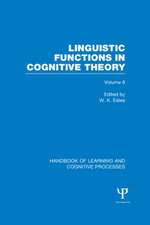Wittgenstein on Sensation and Perception: Wittgenstein's Thought and Legacy
Autor Michael Hymersen Limba Engleză Paperback – 30 iun 2020
| Toate formatele și edițiile | Preț | Express |
|---|---|---|
| Paperback (1) | 389.66 lei 43-57 zile | |
| Taylor & Francis – 30 iun 2020 | 389.66 lei 43-57 zile | |
| Hardback (1) | 1126.47 lei 43-57 zile | |
| Taylor & Francis – 23 ian 2017 | 1126.47 lei 43-57 zile |
Preț: 389.66 lei
Nou
Puncte Express: 584
Preț estimativ în valută:
74.56€ • 78.05$ • 62.06£
74.56€ • 78.05$ • 62.06£
Carte tipărită la comandă
Livrare economică 31 martie-14 aprilie
Preluare comenzi: 021 569.72.76
Specificații
ISBN-13: 9780367595487
ISBN-10: 0367595486
Pagini: 216
Dimensiuni: 152 x 229 x 15 mm
Greutate: 0.32 kg
Ediția:1
Editura: Taylor & Francis
Colecția Routledge
Seria Wittgenstein's Thought and Legacy
Locul publicării:Oxford, United Kingdom
ISBN-10: 0367595486
Pagini: 216
Dimensiuni: 152 x 229 x 15 mm
Greutate: 0.32 kg
Ediția:1
Editura: Taylor & Francis
Colecția Routledge
Seria Wittgenstein's Thought and Legacy
Locul publicării:Oxford, United Kingdom
Public țintă
Postgraduate and UndergraduateCuprins
Preface
1. Sense-Data and the Misleading Metaphor of Phenomenal Space
2. Wittgenstein, Phenomenology, and Sense-Data
3. Phenomenology, Grammar and Private Language
4. The Grammar of First-Person Authority
5. The Contemporary Debate about First-Person Authority
6. Back to Sense-Data?
7. Sensory Qualia
1. Sense-Data and the Misleading Metaphor of Phenomenal Space
2. Wittgenstein, Phenomenology, and Sense-Data
3. Phenomenology, Grammar and Private Language
4. The Grammar of First-Person Authority
5. The Contemporary Debate about First-Person Authority
6. Back to Sense-Data?
7. Sensory Qualia
Recenzii
"Hymer offers detailed analytic reconstructions of Wittgenstein's texts and contemporary debates ... Readers with the necessary background will find it both useful and provocative. Summing Up: Recommended." – CHOICE
"In this book, Michael Hymers highlights the diverse ways in which the mistaken picture of a private phenomenal space figures in arguments for sense-data and qualia. Hymers brings together a wide range of passages from Wittgenstein's later writings to show how they criticize this picture. This is a fascinating and hard-hitting selection." – Notre Dame Philosophical Reviews
"Michael Hymers provides a sustained and valuable analysis of the metaphor of phenomenal space, arguing convincingly that Wittgenstein, from the early 1930s onwards, understood the pitfalls of taking this trope literally. One of the many virtues of Hymers’ work is that it draws attention to a highly productive but little understood period of Wittgenstein’s philosophical development, one that merits greater scholarly attention. Hymers’ meticulous study will be of interest to anyone seeking a better understanding of Wittgenstein’s early work on the grammar of sensation and perception." – Philosophical Investigations
"In this book, Michael Hymers highlights the diverse ways in which the mistaken picture of a private phenomenal space figures in arguments for sense-data and qualia. Hymers brings together a wide range of passages from Wittgenstein's later writings to show how they criticize this picture. This is a fascinating and hard-hitting selection." – Notre Dame Philosophical Reviews
"Michael Hymers provides a sustained and valuable analysis of the metaphor of phenomenal space, arguing convincingly that Wittgenstein, from the early 1930s onwards, understood the pitfalls of taking this trope literally. One of the many virtues of Hymers’ work is that it draws attention to a highly productive but little understood period of Wittgenstein’s philosophical development, one that merits greater scholarly attention. Hymers’ meticulous study will be of interest to anyone seeking a better understanding of Wittgenstein’s early work on the grammar of sensation and perception." – Philosophical Investigations
Descriere
This book offers two claims about Wittgenstein’s views on perception as explored in the Philosophical Investigations. The first is an interpretive claim about Wittgenstein: that his views on sensation and perception, including his critique of private language, have their roots in his reflections on sense-datum theories and on what Hymers





















